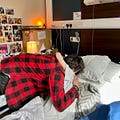Now
you wake for moments at a time.
.
They are usually perturbed, painful periods.
Before you are unconscious again.
.
Sometimes
you are more alert.
You can have brief conversations with visitors.
You can watch a film with me.
You can smile at your sister.
And your mum.
Your dad.
.
But oftentimes
you manage only to make simple requests known:
Morphine.
Anti-emetic.
Slushy.
Up.
Down.
.
Yesterday
you told your sister that you felt different.
Heavier
maybe.
You weren’t sure.
.
Then today
after having your catheter fitted
and struggling to take your medication
we try to get you comfortable.
.
I’m holding you in my arms while the nurse repositions pillows
and you whisper to me
I’m tired, baby.
.
I know
I say.
.
I don’t know how much longer, baby
you say.
.
It’s okay
I say.
.
And I hold you.
It’s been a while since I have
and it feels like home.
.
When I release you back down to the bed again
you are asleep.
.
Later
the doctor comes to see you.
.
Imogen?
he says.
.
Imogen?
he says.
.
You open your eyes.
You look at him.
.
Imogen?
he says.
I see from your chart that you are still in pain.
.
You look at him.
.
You are still in pain
he says
and still experiencing sickness.
.
You look.
.
I can increase the morphine in the driver
and also increase the anti-nausea relief
which would give you some peace
he says.
.
You look.
.
But it might have a sedative effect also
he says.
.
You close you eyes.
And open them again.
.
It might mean
he continues
that you will become more and more sleepy
until eventually
you slip away.
.
You look at him.
.
We look at you.
.
He waits.
.
You shrug your shoulders.
.
He waits.
.
You shrug again.
.
Or?
you say.
.
Whats the alternative?
you say.
.
The alternative is
well
that we continue as we are.
.
As we are is a cycle of mouth pain and stomach pain and back pain and soreness and sleeplessness and confusion.
.
I want to say
You haven’t given up, baby.
.
I want to say
This isn’t giving up.
.
I want to say
You have given this
everything.
.
But I don’t.
.
You shrug again
close your eyes
and go back to sleep.
.
The doctor turns to us
to me
your mum
and your sister.
.
I’m going to increase the pain relief in her driver and add a second driver with the anti-sickness medication
he tells us.
.
We don’t say anything.
Or maybe we say
okay.
.
I can’t remember now.
.
He leaves the room.
.
Okay.
Okay.
Previous > On Coping #24: Stand by me | Next > On Coping # 26: On blistered feet
On Coping is my story of surviving on the sidelines of cancer. It begins in 2022 with On Coping #1, written the day after my 41st birthday. The day my wife Imogen, the mother of my three children, was diagnosed with stage 4 cancer. It’s the story of what happened next. Read from the start.





George this is some of the most beautiful, raw and human writing I have ever read. Thank you from the bottom of my heart for sharing this with us. I’m sure it will help others who are going through similar experiences. Mostly though, I think, it will help your wider family and friends to feel a bit closer to you all - it gives us a connection, and that is a treasured gift. I wish beyond anything it wasn’t so, but it is, so thank you for allowing us in x
Oh George. I'm so, so sorry.
Thank you for all this writing. It's also a gift to the other husbands, fathers of young children who will be saying goodbye to their beloveds.